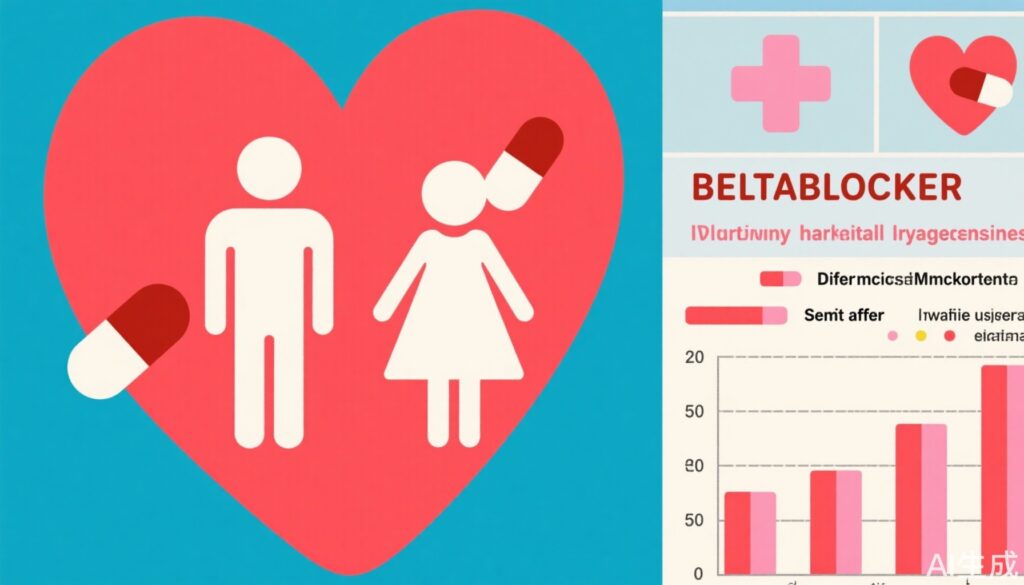Study Background and Disease Burden
Beta-blockers have long been a cornerstone in the management of patients following myocardial infarction (MI), principally due to their established benefits in reducing mortality, recurrent ischemic events, and heart failure in those with impaired left ventricular ejection fraction (LVEF). However, recent evidence has cast doubt on the universal application of beta-blocker therapy post-MI, particularly in patients with preserved or mildly reduced LVEF (>40%). Despite guideline recommendations endorsing beta-blocker use in these patients, emerging data suggest that such benefits may not be consistent across all subpopulations.
Importantly, whether outcomes with beta-blocker therapy differ according to sex remains uncertain. Women, who historically have been underrepresented in cardiovascular trials, often present later, with more comorbidities and receive less guideline-directed medical therapy. Given potential biological and pharmacokinetic differences as well as clinical heterogeneity, sex-specific analyses are critical to optimize post-MI management.
Study Design
The REBOOT trial (tREatment with Beta-blockers after myOcardial infarction withOut reduced ejection fracTion) was designed as the largest randomized controlled trial to evaluate the efficacy and safety of beta-blocker therapy in acute MI patients with LVEF greater than 40%, thus excluding those with significant systolic dysfunction.
A total of 8505 patients were randomized; 8438 patients formed the intention-to-treat population and were assessed in a pre-specified sex-specific subgroup analysis. Participants were managed with contemporary standards of care, and allocation was to beta-blocker therapy or no beta-blocker treatment post-MI. The primary composite endpoint included all-cause death, recurrent MI, or heart failure hospitalization.
The follow-up period had a median duration of 3.7 years. Key variables captured included age, comorbid conditions, adherence to guideline-based therapies, LVEF measurements, and beta-blocker dosages to enable stratified analyses.
Key Findings
Among the 8438 patients, 1627 (19.3%) were women who, compared to men, were older, had a higher burden of comorbidities such as hypertension and diabetes, and were less likely to receive complete guideline-recommended treatments post-MI.
During follow-up, the composite primary endpoint occurred more frequently in women than men, underlining inherent differences in risk profiles. When stratified by beta-blocker allocation, notable sex differences emerged:
– In women, the incidence rate of the primary endpoint was 30.4 events per 1000 patient-years in the beta-blocker group versus 21.0 per 1000 patient-years in the no beta-blocker group. This corresponded to a significant hazard ratio (HR) of 1.45 (95% confidence interval [CI], 1.04–2.03), indicating a 45% increased risk associated with beta-blocker therapy.
– In contrast, men showed no statistically significant difference in primary endpoint rates between beta-blocker and no beta-blocker groups, with an HR of 0.94 (95% CI, 0.79–1.13).
– The interaction between sex and treatment effect was statistically significant (P for interaction = 0.026), confirming differential impact by sex.
Further subgroup analyses highlighted that the excess risk in women was mainly driven by increased mortality rather than recurrent MI or heart failure admissions. This adverse association was most evident in women with preserved LVEF (defined as >50%) and those receiving higher doses of beta-blockers. Statistical tests for interaction by LVEF strata (P = 0.030) and beta-blocker dosage (P = 0.045) supported these findings.
Safety analyses did not reveal an excess of major adverse drug effects to explain increased mortality in women, suggesting complex underlying mechanisms.
Expert Commentary
The REBOOT trial’s sex-specific findings represent a critical advance in cardiovascular therapeutics and precision medicine. Historically, female patients with MI have been managed similarly to males based on extrapolation from predominantly male cohorts. This study robustly challenges the assumption that beta-blockers confer uniform benefits post-MI regardless of sex, especially with preserved ventricular function.
Potential biological explanations may involve sex differences in autonomic regulation, beta-adrenergic receptor density and responsiveness, pharmacodynamics of beta-blockers, and differential adverse effects on cardiac electrophysiology and hemodynamics. The higher baseline risk profile and undertreatment in women could also modulate therapeutic responses.
Contemporary guidelines have already begun to question routine beta-blocker use in all post-MI patients, but the REBOOT trial uniquely emphasizes risk stratification by sex and LVEF. However, limitations include underrepresentation of women (19.3%), raising concerns about power, and the observational nature of dosage subanalyses. Additional mechanistic and prospective studies are warranted to confirm safety signals and optimize dosing strategies.
Conclusion
The REBOOT trial provides compelling evidence that beta-blocker therapy after myocardial infarction with preserved LVEF is associated with harm in women, particularly those receiving higher doses, while it remains neutral in men. These findings challenge current recommendations, underscoring the necessity of sex-tailored therapeutic approaches in cardiovascular care.
Clinicians should cautiously evaluate the indication for beta-blockers in women post-MI without reduced LVEF and weigh potential risks against benefits. Future guidelines may need to incorporate sex and LVEF stratification to refine recommendations. Further research is essential to elucidate mechanisms and develop safer, personalized treatments for this vulnerable population.
References
Rossello X, Dominguez-Rodriguez A, Latini R, Sánchez PL, Raposeiras-Roubín S, Anguita M, Barrabés JA, Grigis G, Owen R, Pocock S, Gómez-Talavera S, García-Lunar I, Escalera N, Pérez-García CN, Di Fusco SA, Pizarro G, López Benito M, Pongetti G, Rincón-Díaz LM, Buera I, Rozado J, García MJ, Prada-Delgado O, Cosmi D, Fuster V, Ibanez B. Beta-blockers after myocardial infarction: effects according to sex in the REBOOT trial. Eur Heart J. 2025 Aug 30:ehaf673. doi: 10.1093/eurheartj/ehaf673. Epub ahead of print. PMID: 40884211.
Other relevant sources:
1. Bangalore S, Makani H, Radford M, et al. Clinical outcomes with beta-blockers for myocardial infarction: a meta-analysis of randomized trials. Am J Med. 2014;127(10):939-953.
2. Mehta PK, Wei J, Wenger NK. Ischemic Heart Disease in Women: A Focused Review on Risk Factors, Symptoms, and Treatment. Trends Cardiovasc Med. 2015;25(2):140-151.
3. Amsterdam EA, Wenger NK, Brindis RG, et al. 2014 AHA/ACC Guideline for the Management of Patients With Non–ST-Elevation Acute Coronary Syndromes. Circulation. 2014;130(25):e344-e426.



